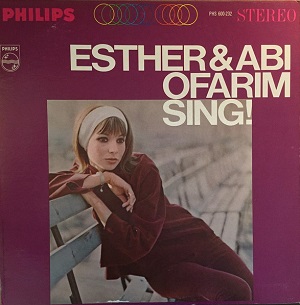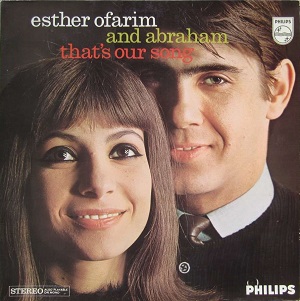
Esther Zaied, better known by her married name Esther Ofarim, is an Israeli singer. She came second in the 1963 Eurovision Song Contest with the song "T'en va pas", representing Switzerland. After marrying Abi Ofarim in 1958, she was half of the husband-and-wife folk duo Esther & Abi Ofarim in the 1960s. After the couple divorced, she undertook a successful solo career.

Songs from a Room is the second album by Canadian musician Leonard Cohen, released in 1969. It reached No. 63 on the US Billboard Top LPs and No. 2 on the UK charts.
"The Water Is Wide" is a folk song of Scottish origin. It remains popular in the 21st century. Cecil Sharp published the song in Folk Songs From Somerset (1906).
Jovano, Jovanke is a traditional folk song originating from the region of Macedonia. It is popular in and frequently performed in North Macedonia, Bulgaria, and the Macedonia region of Greece. The song has also been adapted and performed in neighboring Balkan states such as Bosnia and Herzegovina, Serbia and Croatia. It is about two young lovers separated by their disapproving parents. The song mentions the Vardar river which runs through present-day North Macedonia and present-day Greece.
"Cotton Fields (The Cotton Song)" (also known as In Them Old Cotton Fields Back Home) is a song written by American blues musician Huddie Ledbetter, better known as Lead Belly, who made the first recording of the song in 1940.
"Les Trois Cloches" is a Swiss song written in French by Jean Villard Gilles. Edith Piaf recorded the song a cappella with the French vocal group Les Compagnons de la chanson in July 1946. The song became one of Édith Piaf's biggest hits, and when Piaf toured the US with Les Compagnons de la chanson, they introduced this song to an American audience. Tina Arena also record a hit version in 2000.

"Elle était si jolie" was the French entry in the Eurovision Song Contest 1963, performed in French by Alain Barrière.

Abi Ofarim was an Israeli musician and dancer. He is better known for his work in the 1960s as half of the duo Esther & Abi Ofarim with his then-wife Esther Ofarim.

"Cinderella Rockefella" is a novelty song written by Mason Williams and Nancy Ames. It was originally recorded and released by Israeli folk duo Esther & Abi Ofarim on their 1967 album 2 in 3. It became an international hit single in 1968.

Esther & Abi Ofarim were an Israeli musical duo active during the 1960s, consisting of husband and wife Abi Ofarim and Esther Ofarim. They enjoyed particular success in Germany. They had hits in Europe with their songs "One More Dance," "Morning of My Life," and "Cinderella Rockefella."
"What Have They Done to the Rain" is a protest song against above-ground nuclear testing written by Malvina Reynolds. The song has been sung by many singers such as Joan Baez, and a version by the English band The Searchers was released as a single, which charted in the US and UK.
"The Lonesome Road" is a 1927 song with music by Nathaniel Shilkret and lyrics by Gene Austin, alternately titled "Lonesome Road", "Look Down that Lonesome Road" and "Lonesome Road Blues." It was written in the style of an African-American folk song.
"Freight Train" is an American folk song written by Elizabeth Cotten in the early 20th century, and popularized during the American folk revival and British skiffle period of the 1950s and 1960s. By Cotten's own account in the 1985 BBC series Down Home, she composed “Freight Train” as a teenager, inspired by the sound of the trains rolling in on the tracks near her home in North Carolina.
"Someday Soon" is a song composed by Canadian singer-songwriter Ian Tyson who recorded the song with Sylvia Fricker as the duo Ian & Sylvia in 1963. Cited by Richie Unterberger of Allmusic as "clearly point[ing] toward [its writer's] future C&W/cowboy direction", "Someday Soon" would be brought to prominence via a 1968 recording by Judy Collins, and subsequently recorded by a number of artists primarily in the country and western field. In 2010 "Someday Soon" was honored by the Western Writers of America as one of the "Top 100 Western Songs" of all time.
El Vito is a traditional folk song and dance music of Andalusia whose origins can be traced back to the 16th century. Its name refers to Saint Vitus, patron of dancers. It was created in the nineteenth century as a dancing song typical of the bolero. It includes steps in the art of bullfighting and is usually played by women. The typical costume includes jacket and brimmed hat.

"Sing Hallelujah" is a folk song written by Mike Settle and originally recorded on the album Folk Sing Hallelujah (1961) by Mike Settle and the Settlers. It has been recorded on singles by Jeannie Hoffman 1964, The Upper U. District Singers 1964, Liverpool's The Remo Four 1967, and Germany's The Lords 1966. Israeli duo Esther & Abi Ofarim recorded a rendition which reached No. 30 in Germany in 1966. In 1967, a version by Judy Collins was released as a b-side single in Italy from her album Golden Apples of the Sun (1962).

"One More Dance" is a song written by C. C. Carter. It is a satirical song about cynical lovers. It was first recorded by South African singer Miriam Makeba with Charles Colman for her debut album Miriam Makeba (1960). Makeba performed the song live with American singer Harry Belafonte at Carnegie Hall in 1960. Their duet was released on his album Belafonte Returns to Carnegie Hall (1960). Israeli folk duo Esther & Abi Ofarim recorded popular renditions of the song in different languages.

2 In 3 is an album by Israeli folk duo Esther & Abi Ofarim. It was released on Philips Records in Europe in 1967. This is their most successful album, containing their hits "Cinderella Rockefella" and "Morning of My Life."

Sing! is an album by Israeli folk duo Esther & Abi Ofarim. It was released on Philips Records in 1966. The album was released as The New Esther & Abi Ofarim Album in the UK, Sing Hallelujah! in the Netherlands, and Das Neue Esther & Abi Ofarim Album in Germany.

That's Our Song is an album released by Israeli folk duo Esther & Abi Ofarim. It was released in Europe on Philips Records in 1965. The album was released as Neue Songs Der Welt in Germany.











